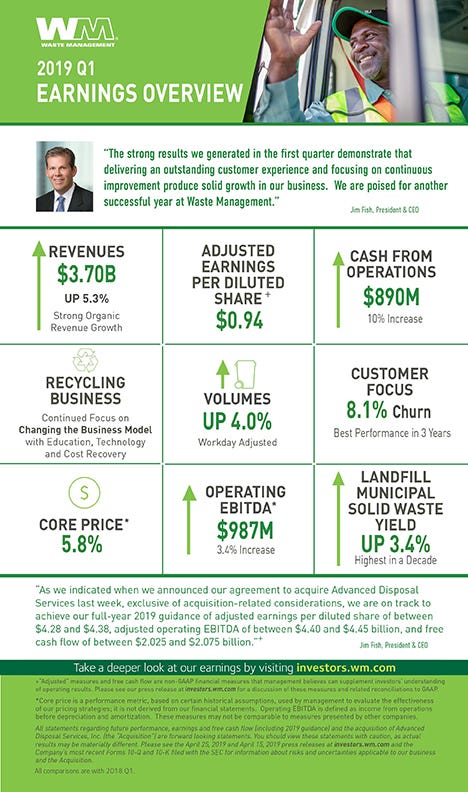Waste Management Touts Strong Growth for Q1 2019, Discusses ADS Deal
Waste Management president and CEO says ADS acquisition aligns with growth strategies and financial goals during investor call.
During a call with investors on April 25, Houston-based Waste Management Inc. announced what President and CEO Jim Fish called “two good news stories”—the company’s strong first quarter results as well as the recently announced acquisition of Ponte Vedra, Fla.-based Advanced Disposal Services (ADS).
“The year is off to a great start with organic revenue growth of 6 percent in our collection and disposal business, translating into about a 7 percent increase in operating EBITDA,” said Fish during the call. “On April 15, we announced a definitive agreement to acquire all outstanding shares of ADS for $33.15 per share. The acquisition aligns with our growth strategy and our financial goals including growth, market shares and free cash flow.”
Fish explained that Waste Management expects to achieve more than $100 million in annual capital expenditure synergies from the acquisition. He added that the acquisition is expected to close in 2020, subject to the satisfaction of customary closing conditions, including regulatory approvals.
“We are enthusiastic about this catalyst for long-term value for our shareholders in 2020 and beyond,” he said. “We believe we can leverage benefits of the investments we’re making in technology and people to achieve enhanced efficiency across the ADS network in the coming years. ADS has talented and dedicated employees, and we look forward to capitalizing on the strengths of both organizations.”
Revenues for Q1 2019 were $3.70 billion, compared with $3.51 billion for the same 2018 period. Net income for the quarter was $347 million, or $0.81 per diluted share, compared with $396 million, or $0.91 per diluted share, for the first quarter of 2018. On an adjusted basis in the first quarter of 2019, net income was $402 million, or $0.94 per diluted share.

“The strong results we generated in the first quarter demonstrate that delivering an outstanding customer experience and focusing on continuous improvement produce solid growth in our business,” said Fish in a statement. “In the first quarter, we saw organic revenue growth of more than 6 percent in our collection and disposal business, which translated into about a 7 percent increase in operating EBITDA in that business. More importantly, this strong operational performance resulted in net cash provided by operating activities increasing by 10 percent when compared to 2018."
“The focus and discipline of our employees continue to drive exceptional results,” added Fish. “That discipline is also evident in our recycling line of business, where the steps we took to improve the business increased operating EBITDA by $11 million when compared to the first quarter of 2018, despite a 28 percent decline in recycling commodity prices. The great start to 2019 puts us well on our way to meeting our targets for the full year.”
Here are some additional key highlights for Q1 2019:
Total operating EBITDA was $987 million for Q1 2019, an increase of $32 million, or 3.4 percent, from Q1 2018. The company achieved this increase without the benefit of the expired federal natural gas fuel credits that added $28 million to operating EBITDA in Q1 2018.
Operating EBITDA in the company’s collection and disposal business increased $76 million, or about 7 percent, in Q1 2019, compared to the same period in 2018.
In Q1 2019, revenue growth was driven by strong yield and volume growth in the company’s collection and disposal business, which contributed $190 million of incremental revenue. This was partially offset by a $16 million decline in revenue from the company’s recycling line of business on a year-over-year basis in the first quarter of 2019.
Core price for Q1 2019 was 5.8 percent, compared to 4.9 percent in Q1 2018.
Internal revenue growth from yield for the collection and disposal business was 2.7 percent for Q1 2019 versus 2.3 percent in Q1 2018. Collection and disposal business internal revenue growth from volume was 3.6 percent, or 4.1 percent on a workday adjusted basis, in Q1 2019. Total company internal revenue growth from volume, which includes the recycling business, was 3.4 percent, or 4 percent on a workday adjusted basis, in the first quarter of 2019.
Average recycling commodity prices at the company’s facilities were approximately 28 percent lower in the first quarter of 2019, compared to the prior year period. Recycling brokerage volumes increased 7.1 percent in the first quarter of 2019 on a workday adjusted basis.
Regarding a question about recycling headwinds, Fish noted that extreme supply and demand have led to the recycling imbalance. “We feel strategically it doesn’t make sense for us to sit back and rely on the rest of the world to figure it out,” he emphasized. “That’s why we said we are building a recycling plan of the future last quarter, so we can address that on our own. We believe it will significantly reduce operating costs, which is part of what we’re doing to address this downturn in the business that we really don’t have much control over, so we are trying to fix some things we can control on our own.”
Operating EBITDA in the company’s recycling line of business improved by $11 million from breakeven in the first quarter of 2018. The improvement was driven by the company’s efforts to develop a sustainable business model that meets customers’ environmental needs.
As a percent of revenue, total company operating expenses were 62.2 percent in both the first quarter of 2019 and 2018. The company’s focus on improving efficiency in its collection business, controlling costs and maintaining discipline in its pricing programs delivered margin expansion sufficient to offset an 80-basis point headwind from federal natural gas fuel credits received in 2018. “We did a good job of managing our costs as we had to manage an 80-basis point headwind from the federal natural gas fuel credits not repeating,” noted John Morris, chief operating officer, during the call with investors.
As a percentage of revenue, SG&A expenses were 11.1 percent in Q1 2019, compared to 10.6 percent in Q1 2018. The increase was primarily related to planned investments in technology as well as litigation reserves.
Net cash provided by operating activities was $890 million in the first quarter of 2019, an increase of $81 million, or 10 percent, when compared to Q1 2018.
Capital expenditures were $471 million in Q1 2019, a $71 million increase from Q1 2018.
Free cash flow was $431 million in Q1 2019, compared to $423 million in Q1 2018.
The company paid $223 million of dividends to shareholders. Cash allocated to share repurchases of $68 million in Q1 2019 was less than both prior year and the company’s plan due to completed and contemplated acquisition spending.
The company spent $394 million on acquisitions during Q1 2019. During the call, Chief Financial Officer Devina Rankin added that the company has already completed the high end of its acquisition guidance for the year.
The company’s effective tax rate for Q1 2019 was approximately 24.8 percent. On an adjusted basis, the company’s tax rate was 22.2 percent. Waste Management expects its 2019 full-year adjusted tax rate to be approximately 24 percent.
“We are poised for another successful year at Waste Management. As we indicated when we announced our agreement to acquire Advanced Disposal Services last week, exclusive of acquisition-related considerations, we are on track to achieve our full-year 2019 guidance of adjusted earnings per diluted share of between $4.28 and $4.38, adjusted operating EBITDA of between $4.40 and $4.45 billion, and free cash flow of between $2.025 and $2.075 billion,” said Fish in a statement.
Fish also said that the company is opening its second state-of-the-art driver and technician training center, extending the commitment to provide centralized training for drivers and technicians across the organization. “In the first quarter, we saw a meaningful reduction in safety incidents of drivers with less than a year of experience,” he explained. “Focusing on our onboarding process for new drivers is clearly paying off.”
Regarding the ADS acquisition, Rankin noted that Waste Management is still in the early stages of determining its financial strategy for the acquisition.
“While the agreement is certainly exciting news, it’s just the first step in bringing the two companies together,” explained Morris. “Over the coming months, we will assemble an integration planning team to determine how to best assemble our operations. Like our operations, the two companies’ cultures are very complementary—with a shared commitment to outstanding customer service, safety and operational excellence. We expect a smooth integration acquisition process for this acquisition. We will be ready to execute as soon as the deal closes.”
About the Author
You May Also Like




